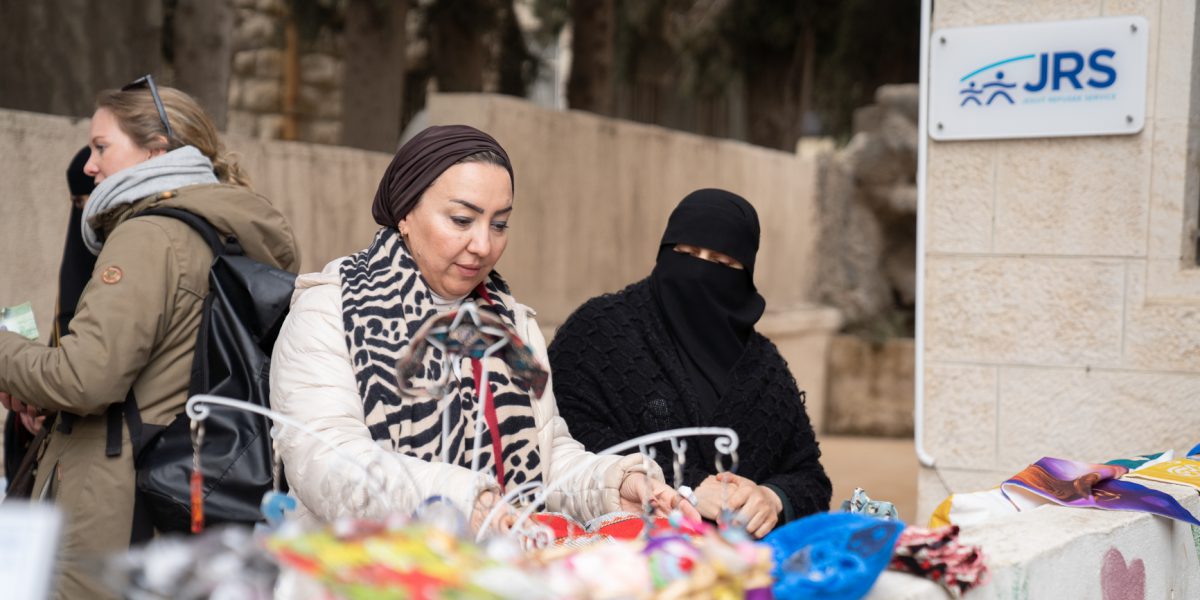JRS Jordan: A Celebration of Mothers, Homelands, and Community
09 May 2022

As we celebrate Mother’s Day here in the United States, we must also remember the millions of mothers taking care of their families while living through forced displacement. Time and time again, JRS has encountered resilient women using their love and talents to help them through challenges associated with having to flee their homes.
One such example of both talent and love was the bazaar that Jesuit Refugee Service organized for Mother’s Day in Jordan in March.
“It was the best occasion to celebrate the efforts, creativity, and talents of women,” Silvia Mazzocchin, the communications officer at JRS Jordan told The Jordan Times.
Mother’s Day, which is celebrated on the first day of spring in Jordan, brought back life to the JRS Community Centre after two years of break due to Covid restrictions. The event brought 35 vendors together in the Jabal Al Hussein neighborhood, where many refugee communities live, in Amman, Jordan. Some of the participating vendors brought goods like handmade art, traditional foods, henna art, and embroidery to sell at the event.
Under the olive tree in front of JRS Community Centre in Amman, the tables were covered with handicrafts and art creations. Next to the tables, the creators of the accessories, paintings and embroidery pieces welcomed the guests visiting the Mother’s Day Bazaar. This day is an opportunity to celebrate the efforts, creativity, and talents of women, who – particularly if also refugees – are the ones facing the biggest challenges.
They hailed from a variety of places, including Yemen, Syria, Iraq, Jordan, Sudan, and Algeria. The refugees who participated in the event also brought with them pieces of their cultures to share with the rest of the community, and most of the people who made and sold goods were women. One woman, a mother from Syria, brought her daughter’s art to sell at the event. According to The Jordan Times, her daughter hand crafted wooden plates and decorated them with Arabic calligraphy that shared sentiments like ‘my mother is my life,’ so that people were able to buy the artwork as a gift for their own mothers.
Ms. Mazzocchin saw the Mother’s Day Bazaar not only as a way of supporting the economic success of refugees but also as an opportunity for the people to share a piece of their cultures with one another.
Walking through the different stands, the guests had the opportunity to smell balms and spices from Yemen, try on traditional abayas (long dress for women) from Syria, admire accessories made by Iraqi families, get henna drawings made by Sudanese women, and try Algerian sweet pastries. All around was food from the different countries, spicy Yemeni tea, drawings, crochet creations, hand-made soap, paintings on glass.
A woman, who fled with her family from Iraq following an ISIS attack, wore a traditional dress called charuga from her Christian community in her hometown. The colorful embroidery on the dress represents the church of her town, Qaraqosh. All the women in Qaraqosh – the grandmothers, the mothers, and the daughters – wear this dress.
The music from different countries encouraged some guests to start dancing, and JRS colleagues to start moving in a circle following the steps of dabke, a traditional Jordanian and Levantine dance.
A Syrian teenager who has lived in Jordan for the past ten years sold some of her family’s traditional meals. “This kind of food from home is important to me because these are the dishes that my grandmother would make,” she told The Jordan Times.
“It was a nice experience, I met new people and learned things that I didn’t know before. Thank you to everyone who contributed in the bazaar,” said a participant.
Another woman told us: “The truth is that we were very happy to participate, and we benefitted from it financially and personally. JRS is my family and I enjoy having you around! God compensated my loss with another family. May God protect and assist JRS in their work for refugees!”


